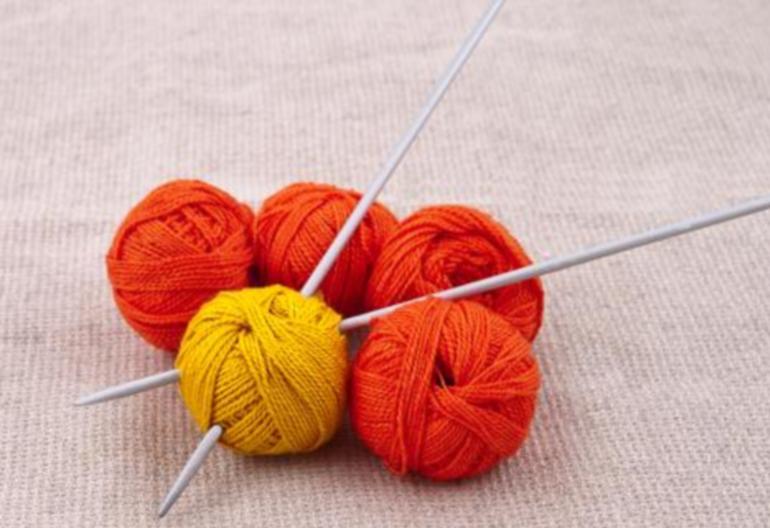
There are many methods to learn knitting. A beginner kit, an online community, a family member, friend, or tutor are all options. To discover the right method, you should first experiment.
Beginner kits
An excellent way to learn knitting is to get a beginner kit. These kits often include yarn and a pattern. You may also find other knitting notions in these kits. Knitting kits are great for making large blankets or mittens.

Online communities
If you're looking for a community of knitters, there are several online options. One option is a forum. This is a place to share your knitting tips with other knitters. Another option is to join a knitting group in person. If you have a full time job, children, or are suffering from chronic illness, it can be difficult to join in-person knitting groups.
Tutors
Beginning knitters need tutors to help them learn the craft. At least 45 minutes should be allotted for the first lesson. Once the student has mastered the basic skills, he or she can be a self-sufficient knitter. Teachers should be patient and kind with their students. Children pick up concepts much quicker than adults.
Friend or family member
Most people who are good at knitting will enjoy teaching others how they do it. There's a person in your family who can help you, no matter how advanced or novice you are at knitting. The person who is teaching you may not have as much experience as you do, so they won't be able to give you as detailed instruction as a teacher.

Online classes
There are many methods to learn to knit. Some online classes can help you make a scarf or a sweater without having to buy expensive materials. Some offer personalized instruction that you can start at your own pace. Some classes can also be found in person, but you may be more inclined to learn online.
FAQ
What are some competitive hobbies?
Running, swimming, cycling and tennis are all competitive sports.
They're usually played by people who enjoy physical activity but also provide an opportunity for social interaction.
You'll likely find others who are interested in your hobby if it involves physical activity.
You might consider joining a group or club that meets regularly to play together in sports.
You might also choose to participate in team games involving playing alongside others.
These include: football (soccer), soccer, cricket, netball.
There are many kinds of competition.
Some competitions can be used for only recreational purposes.
Others are used to assess competitors' abilities.
Other rewards are available to recognize exceptional performance.
In these cases, the winners receive prizes.
Other competitions test strength and endurance.
These are known as endurance events.
For example, marathon races, triathlons, Ironman Triathlon, etc.
Before competing in these events, athletes train hard.
They will follow a strict training program to prepare themselves mentally and physically.
They may need to spend some time out of their home for preparation.
It's important not to forget that not all athletes are able to compete in every type event.
Can I make money by my hobby?
Many hobbies can bring in extra income.
If you're passionate enough about your hobby, you may decide to sell items related to it.
A website might be a good idea if your hobby is collecting stamps.
You can also make extra income by selling and buying stamps.
Another option is to start a YouTube channel in which you discuss your hobby.
This allows for you to share your passions with others and can potentially generate additional income by providing premium content.
What is a hobby for kids?
Any activity that kids enjoy as a hobby is something they do outside of the normal routine. You might find them interested in drawing, building things, painting, writing stories, playing with toys, listening to music, reading books, watching TV, and playing computer games. They may also like to play soccer, football, basketball, cricket, rugby, baseball, and hockey.
Parents worry that their children might get in trouble if they are allowed to do what they like. But this isn't always true. Your child will not get into trouble if he or she is safe and doesn’t cause any harm to other people or themselves.
It is important that people remember that simply because they love doing something does not mean they will always do it. If they don't like writing but love drawing, they might choose to draw images instead.
There are many different hobbies, so it is up to you which one you love the most.
Statistics
- A new survey by Pew Research Center of teens ages 13 to 17 finds that 36% of girls feel tense or nervous about their day every day; 23% of boys say the same. (pewresearch.org)
- Almost 80% of people claim to have no hobby. (hobbylark.com)
- This 100% accurate personality-analyzing hobby quiz discovers your passion based on your characteristics. (quizexpo.com)
- The intensity of the dialogue partners' bond at the end of the forty-five-minute vulnerability interaction was rated as closer than the closest relationship in the lives of 30 percent of similar students. (time.com)
- Studies show that just six minutes of reading can reduce stress levels by 60 percent. (oberlo.com)
External Links
How To
How to Find the Right Hobby for Me
It is possible to determine if your hobby is the right one if you ask questions.
-
Do I enjoy doing it?
-
Do I get pleasure from it?
-
Do you think it's something I would enjoy doing when I get older?
-
What are my strengths?
-
Are there ways to improve?
-
Would I recommend it?
-
It will bring me joy.
-
Do you think it will allow me to relax?
-
Do I feel better?
-
What skills will I gain from it?
-
Will it let me meet new friends?
-
Can I express my creativity through it?
-
Do I have the opportunity to learn something new?
-
Is it going give me confidence?
-
Is it going to give me a sense of accomplishment?
-
Is it possible to achieve financial success?
-
Is it possible to travel with it?
-
Will it allow me to explore new places?
-
Will it motivate me to exercise more?
-
Will it encourage me to work harder and do I feel inspired?
-
Will it motivate me to succeed?
-
Will it involve me in activities that I wouldn't normally consider doing?
-
Can it be a challenge?
-
Will it be fun?
-
Is it going to keep me fit?
-
It will save you money.
-
Can it lower stress levels
-
Is it going to stop me from getting bored?
-
Will it free up my time?